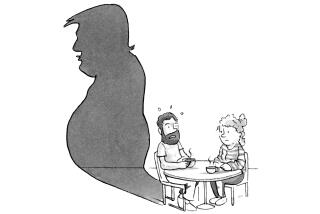The strangers next door
- Share via
IT happens occasionally that a reviewer admires the intention of a book without admiring the book. Marina Budhos has taken on a subject -- the world after 9/11 -- that few novelists have yet approached. She has done it head-on, and she has done it in a novel for teenagers.
In “Ask Me No Questions,” we meet the Hossain family in a state of high anxiety, in a car in the snow, heading north from New York City to the Canadian border to seek asylum. Immigrants from Bangladesh, they came to the United States eight years earlier on a tourist visa. Living on an expired visa is precarious enough, but after Sept. 11, the position of Muslims in the United States changed dramatically. Adult men from certain countries, including Bangladesh, were required to register with the government. Many people without proper legal status fled to Canada rather than register, and many of these were turned back, only to be arrested when they tried to reenter the United States.
The Hossain family is turned back from the border by a possibly sympathetic but utterly overwhelmed Canadian border guard. When Mr. Hossain is -- inevitably, bureaucratically, almost politely -- taken into custody, the family must decide what to do. The mother, shy, with an uncertain command of English garnered from cooking shows on television, stays in a shelter nearby while they wait for a hearing.
Meanwhile, the daughters -- 13-year-old Nadira, the narrator, and her sister Aisha, a high school senior -- go back to New York to stay with relatives. They carry on as if nothing is wrong and tell no one what is happening in the family.
For Aisha, her father’s arrest is a particularly hard blow. A star student, she is just beginning her college entrance interviews and vying to be class valedictorian. The Hossains are far from traditional. Mr. Hossain stands firm against friends who shake their heads and warn him that his older daughter will be too educated to find a husband. The Hossains have staked out a tenuous place in their new country’s economy, and they mean to bring to it all the force of their good hearts and strong wills.
It may seem small-minded in the face of such a compelling topic to complain that it’s not very good fiction. But with all the literary soul-searching in recent weeks about the lack of truthfulness in today’s nonfiction (thanks to James Frey’s pseudo-memoir), I’ve been thinking about the abuse fiction regularly takes from writers stuffing novels with fact -- what might be called excessive truthfulness. There is a didactic tendency in fiction for young readers, and young-adult fiction has only in the last few years freed itself from the grip of the “problem novel”--those endless books about divorcing parents, drunken fathers, incompetent mothers, rejected gay children. “Ask Me No Questions” is essentially a problem novel, albeit on a more politically complex topic. It furrows its brow and earnestly applies itself to a problem.
That said, Budhos is clearly a gifted observer. Her intention is admirable: to give readers a sympathetic insight into the secret stresses of people we live with, who may bus our tables or sell our newspapers, who may sit at the next desk at school. In an earlier nonfiction book, “Remix,” she explored the experiences of immigrant families in a series of conversations with teenagers. “Ask Me No Questions” bears the mark of much sensitive research.
The problem is that the novel reads like a magazine profile thinly disguised as fiction. We do not come to know the people in the story; they seem to be composite characters, with qualities chosen from column A, B or C. Nadira loves American junk food; her mother has her cooking shows. Minor characters exist to make a point; a family friend who runs a newsstand is the pious Muslim in traditional dress. About him, Nadira reports, “He once told me that every action, every word of his, is watched by Allah. If I say a word that is angry, he explained, then I should never be surprised by the harm. And if I say something good, then it is like watching my own garden grow.” There, we have learned something about Islam.
Teenagers should, of course, be encouraged to think about society and politics. Many schools and libraries will happily pounce on this book. Perhaps some readers will reflect on the nannies who cared for them when they were younger and consider that those careful, polite children who sometimes accompanied the nanny may have been harboring family secrets just as the Hossain children do. But a novel should not be confused with a civics lesson.
What will stay with me most about this novel is Nadira’s description of the world they left behind in Bangladesh, a world of water: “My family lived in a part of the world where there was no difference between land and sea. The water rose, and you went with it, like the reeds that leaned and bent outside. And after the rainy season was over once more, the land returned. There were no borders. There was only this way of living, back and forth between ground and water, year after year.”
This short passage contains an image of immigrant life that speaks to me more than the wooden story of the novel: a world without borders in which human beings must go where they can live, where the threat of violence and the forces of nature are greater than the power of correctly stamped papers. When I understand this truth about the Hossains, I love them, and I want them as neighbors. *
More to Read
Sign up for our Book Club newsletter
Get the latest news, events and more from the Los Angeles Times Book Club, and help us get L.A. reading and talking.
You may occasionally receive promotional content from the Los Angeles Times.








